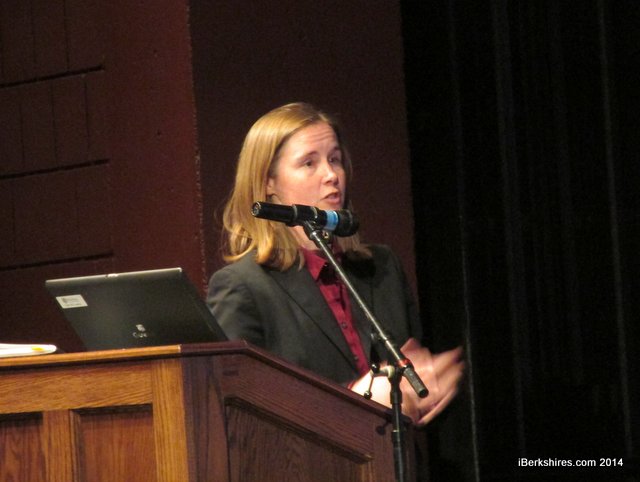Conservation Law Foundation Attorney Guides Towns Through Pipeline ProcessBy Andy McKeever, iBerkshires Staff
10:29PM / Thursday, September 18, 2014 | |
 Shanna Cleveland responded to Berkshire Regional Planning Commission's questions about the FERC process. Shanna Cleveland responded to Berkshire Regional Planning Commission's questions about the FERC process. |
PITTSFIELD, Mass. — Conservation Law Foundation attorney Shanna Cleveland says it is critically important for affected towns to become intervenors in the permitting process for the Tennessee Pipeline expansion and that they pay attention to every detail.
Cleveland was a guest of the Berkshire Regional Planning Commission's special meeting in which Cleveland and Kinder Morgan, the pipeline's proponents, gave presentations about the process.
Earlier this week, Kinder Morgan entered the pre-filing stage with the Federal Energy Regulatory Commission to bring a 36-inch transmission line through the county on its way north to Maine.
In the next 12 months of the pre-filing stage, Cleveland says towns need to be vigilant in paying attention to every single detail and every "resource report" filed.
"Whatever record FERC has before them at the end of that process is what FERC will base their decision on," Cleveland said.
The next 12 months is when information will flow into FERC and residents can sign up for alerts through the website for whenever a document is filed. Cleveland said the resource reports outline an array of aspects but to look through each to make sure nothing is left out.
She said in this stage, municipalities, organizations and individuals have a chance to help dictate the scope of the review. For example, Cleveland said towns can petition for FERC to do review the overall impacts on the energy market and overall greenhouse gas impacts.
But, she also warned to make sure any comments submitted to FERC is under their purview and to keep them focused on exactly what FERC can do. Meanwhile, the environmental impact survey will be drafted and that, too, should be looked at closely, she said.
After that, the formal application process begins. Then a community will need to file a formal motion to become an intervenor in the process.
"Intervention gives you a legal status you wouldn't have if you were to just comment," Cleveland said.
She recommended hiring outside council for the process, particularly an attorney who has been through the FERC process before. In the formal process, the environmental report will be published and put out to comment, she said.
FERC then makes a preliminary determination, responds to comments and the ultimately approves the survey.
"Essentially, that confers the project the ability to move forward," she said.
After that the certificate of public need is issued, which gives the company the OK to use eminent domain along the route.
Towns can only appeal or ask for a "re-hearing" for the certificate if they are intervenors in the process.
But the process is 100 percent played out in the federal courts. Cleveland said keeping documents and compiling records on local and state permits can also play a role. While the federal agency ultimately can override anything, local and state permits will be needed.
"There are a couple of areas in which the states and the localities retain permitting authority," she said. "They will essentially be applying for a lot of the same state and local permits during the formal application process."
Then there is a chance to add conditions to the project but since the federal government can override local authority, Cleveland says to build a record ahead of time. She said conservation commissions and other boards should be looking at the pipeline route, compiling expert testimony and going through what permits may be needed before that process even begins. That way, if the company appeals there is a body of documentation to support the local decision.
"The first thing a community wants to do is look at the proposed project, proposed route, and look at seeing if it meets the criteria for the local permits it would need," Cleveland said.
Overall, Cleveland says the more people that look over each document, the better the final outcome will be.
| 
 MEMBER SIGN IN
MEMBER SIGN IN
 MEMBER SIGN IN
MEMBER SIGN IN